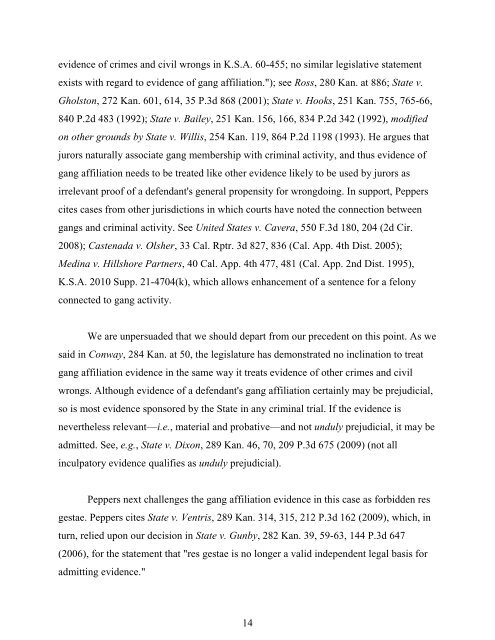Kansas Supreme Court - 101551 â State v. Peppers
Kansas Supreme Court - 101551 â State v. Peppers
Kansas Supreme Court - 101551 â State v. Peppers
Create successful ePaper yourself
Turn your PDF publications into a flip-book with our unique Google optimized e-Paper software.
evidence of crimes and civil wrongs in K.S.A. 60-455; no similar legislative statement<br />
exists with regard to evidence of gang affiliation."); see Ross, 280 Kan. at 886; <strong>State</strong> v.<br />
Gholston, 272 Kan. 601, 614, 35 P.3d 868 (2001); <strong>State</strong> v. Hooks, 251 Kan. 755, 765-66,<br />
840 P.2d 483 (1992); <strong>State</strong> v. Bailey, 251 Kan. 156, 166, 834 P.2d 342 (1992), modified<br />
on other grounds by <strong>State</strong> v. Willis, 254 Kan. 119, 864 P.2d 1198 (1993). He argues that<br />
jurors naturally associate gang membership with criminal activity, and thus evidence of<br />
gang affiliation needs to be treated like other evidence likely to be used by jurors as<br />
irrelevant proof of a defendant's general propensity for wrongdoing. In support, <strong>Peppers</strong><br />
cites cases from other jurisdictions in which courts have noted the connection between<br />
gangs and criminal activity. See United <strong>State</strong>s v. Cavera, 550 F.3d 180, 204 (2d Cir.<br />
2008); Castenada v. Olsher, 33 Cal. Rptr. 3d 827, 836 (Cal. App. 4th Dist. 2005);<br />
Medina v. Hillshore Partners, 40 Cal. App. 4th 477, 481 (Cal. App. 2nd Dist. 1995),<br />
K.S.A. 2010 Supp. 21-4704(k), which allows enhancement of a sentence for a felony<br />
connected to gang activity.<br />
We are unpersuaded that we should depart from our precedent on this point. As we<br />
said in Conway, 284 Kan. at 50, the legislature has demonstrated no inclination to treat<br />
gang affiliation evidence in the same way it treats evidence of other crimes and civil<br />
wrongs. Although evidence of a defendant's gang affiliation certainly may be prejudicial,<br />
so is most evidence sponsored by the <strong>State</strong> in any criminal trial. If the evidence is<br />
nevertheless relevant—i.e., material and probative—and not unduly prejudicial, it may be<br />
admitted. See, e.g., <strong>State</strong> v. Dixon, 289 Kan. 46, 70, 209 P.3d 675 (2009) (not all<br />
inculpatory evidence qualifies as unduly prejudicial).<br />
<strong>Peppers</strong> next challenges the gang affiliation evidence in this case as forbidden res<br />
gestae. <strong>Peppers</strong> cites <strong>State</strong> v. Ventris, 289 Kan. 314, 315, 212 P.3d 162 (2009), which, in<br />
turn, relied upon our decision in <strong>State</strong> v. Gunby, 282 Kan. 39, 59-63, 144 P.3d 647<br />
(2006), for the statement that "res gestae is no longer a valid independent legal basis for<br />
admitting evidence."<br />
14
















